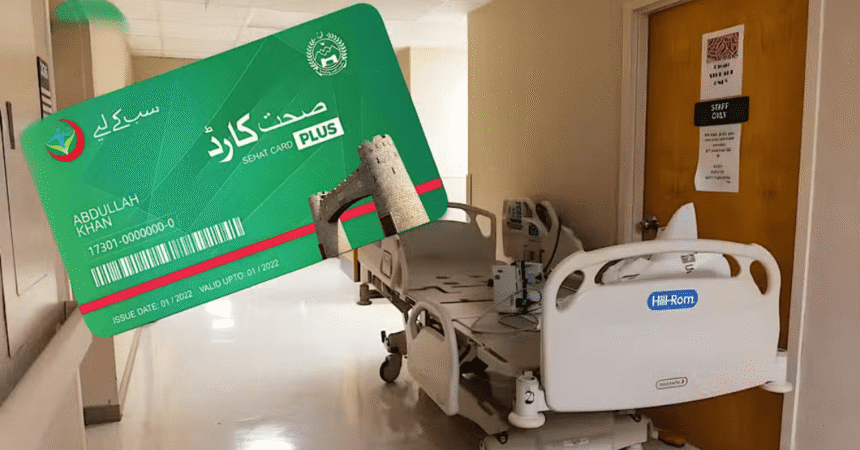In a significant development aimed at bolstering social protection for residents of Khyber Pakhtunkhwa (KP), Chief Minister Ali Amin Gandapur has announced the integration of life insurance into the Sehat Card Plus program. This decision was reached during a strategic meeting focused on enhancing the province’s healthcare initiative, which has already made considerable strides in improving access to medical services for the population.
Background of the Sehat Card Plus Program
Launched as a flagship initiative of the Pakistan Tehreek-e-Insaf (PTI) government, the Sehat Card Plus program aims to provide comprehensive healthcare coverage to all residents of KP. The program has been pivotal in addressing healthcare inequalities, especially for low-income families who often face financial barriers when seeking medical care.
The Sehat Card allows beneficiaries to access free healthcare services at designated hospitals, covering a wide array of medical conditions, from routine check-ups to more complex surgeries. By incorporating life insurance, the government intends to extend this support to include financial protection in the event of unforeseen circumstances, thereby enhancing the overall welfare of families in the province.
The Meeting: Key Participants and Discussions
The meeting where this significant decision was made included key officials such as Health Advisor Ahtisham Ali, Finance Advisor Muzzamil Aslam, and representatives from both the Health Department and the State Life Insurance Corporation. This gathering was not only critical for laying out the framework for the insurance integration but also served as a platform for discussing existing challenges within the healthcare system.
During the discussions, Chief Minister Gandapur emphasized the importance of the Sehat Card Plus program as a critical lifeline for residents. He specifically addressed concerns regarding the suspension of cardiac surgeries at the Peshawar Institute of Cardiology (PIC), which had raised alarms among the public and healthcare professionals alike.
Gandapur instructed health officials to ensure that these surgeries resume without delay, asserting that the government would cover any additional costs associated with this essential service. This prompt response reflects the government’s commitment to ensuring that residents have access to necessary medical interventions, especially those as critical as cardiac surgeries.
Addressing Healthcare Needs
The Importance of Life Insurance
Integrating life insurance into the Sehat Card Plus program represents a strategic move to enhance the safety net for families in KP. Life insurance can provide financial security to families in the event of the unexpected death of a breadwinner, which can be particularly devastating in low-income households.
By offering this additional layer of protection, the government is acknowledging the multifaceted challenges that families face, particularly in the context of health crises. This initiative aims to alleviate the financial strain that often accompanies serious health issues or tragic events, ensuring that families can focus on recovery rather than financial burdens.
Resumption of Cardiac Surgeries
The suspension of cardiac surgeries at the PIC was a significant concern for many residents. Cardiac conditions are among the leading health issues in Pakistan, making timely surgical interventions crucial. The Chief Minister’s directive to resume these surgeries promptly is an indication of the government’s understanding of the urgency involved in such medical situations.
The resumption of services at the PIC is essential not only for the patients awaiting surgery but also for restoring public confidence in the healthcare system. Ensuring that such critical services are available demonstrates the government’s commitment to public health and its proactive approach to addressing healthcare challenges.
Enhancing Access to Quality Healthcare
Expansion of Hospital Network
Another critical aspect of the recent announcements involves expanding the network of hospitals that participate in the Sehat Card Plus program. By adding reputable hospitals to the panel, the government aims to ensure that citizens, particularly those in remote areas, have access to quality healthcare services without financial burden.
The expansion will involve evaluating and approving hospitals based on their service quality and capacity to provide comprehensive care. This is a vital step in addressing healthcare disparities that often leave residents in remote regions underserved. By increasing access to quality medical facilities, the government hopes to improve health outcomes across the province.
Commitment to Timely Payments
To ensure the seamless delivery of services under the Sehat Card Plus program, the government has reaffirmed its commitment to making timely payments to the State Life Insurance Corporation. This financial assurance is crucial in preventing any disruptions in the healthcare services offered to patients under the program.
Timely payments are essential not only for maintaining the operational efficiency of the healthcare providers involved but also for fostering trust between the government and the institutions it collaborates with. By prioritizing these payments, the government can ensure that residents continue to receive free healthcare services without interruption.
Promoting Transparency and Accountability
Importance of Transparency
In any large-scale public health initiative, transparency and accountability are critical to maintaining public trust and ensuring effective implementation. Chief Minister Gandapur has stressed the need for greater transparency within the Sehat Card Plus program.
This involves not only clear communication about the benefits and limitations of the program but also regular reporting on its outcomes and effectiveness. By making this information accessible to the public, the government can foster an environment of trust and engagement, encouraging more residents to take advantage of the services offered.
Accountability Mechanisms
To complement transparency, the implementation of accountability mechanisms is essential. This could include regular audits of the program, feedback mechanisms for beneficiaries, and public forums where residents can voice their concerns and suggestions.
By actively involving the community in monitoring the program, the government can ensure that it remains responsive to the needs of the people it serves. This participatory approach can also help identify areas for improvement and foster a sense of ownership among the public.
Community Engagement and Education
Engaging the Community
Community engagement plays a pivotal role in the success of healthcare initiatives. The government must work collaboratively with local communities to raise awareness about the Sehat Card Plus program and its benefits, including the newly added life insurance component.
Organizing outreach programs, workshops, and informational sessions can help demystify the program and encourage more residents to enroll. Engaging community leaders and local organizations can amplify these efforts, ensuring that information reaches even the most remote areas of the province.
Educational Campaigns
In addition to direct engagement, educational campaigns are vital in informing the public about the various services available under the Sehat Card Plus program. These campaigns should focus on demystifying healthcare processes, explaining how to access services, and highlighting the importance of preventive care.
By promoting health literacy, the government can empower residents to take charge of their health and well-being. Understanding the benefits of the Sehat Card and how to navigate the healthcare system can lead to more proactive health-seeking behavior among the population.
Challenges Ahead
While the integration of life insurance into the Sehat Card Plus program is a positive step, several challenges remain that need to be addressed to ensure the program’s success.
Financial Sustainability
One of the key challenges is ensuring the financial sustainability of the program. The government must carefully manage resources to meet the growing healthcare demands while maintaining the quality of services provided. This includes balancing the budget to accommodate the additional costs associated with integrating life insurance and expanding the network of hospitals.
Overcoming Bureaucratic Hurdles
Bureaucratic hurdles can also impede the smooth implementation of healthcare initiatives. Streamlining processes and reducing red tape can facilitate quicker approvals for hospital participation and ensure that beneficiaries can access services without unnecessary delays.
Ensuring Quality of Care
As the network of hospitals expands, ensuring the quality of care across all facilities is paramount. The government must establish clear guidelines and standards for participating hospitals to ensure that all patients receive high-quality medical attention.
Future Prospects
Continuous Improvement
The addition of life insurance to the Sehat Card Plus program represents a commitment to continuous improvement in healthcare delivery. By regularly assessing the program’s effectiveness and making necessary adjustments, the government can enhance its impact on public health.
Building a Comprehensive Health System
In the long term, integrating life insurance is a step towards building a more comprehensive healthcare system in KP. This approach recognizes that health and financial security are interconnected and that effective healthcare requires a holistic view of individuals’ needs.
Fostering Public Trust
Ultimately, the success of the Sehat Card Plus program and the newly added life insurance component hinges on public trust. By maintaining transparency, ensuring accountability, and engaging communities, the government can foster confidence in its healthcare initiatives, encouraging greater participation and support.
The announcement of life insurance integration into the Sehat Card Plus program marks a significant advancement in Khyber Pakhtunkhwa’s healthcare landscape. With the government’s commitment to enhancing healthcare access and ensuring financial protection for families, this initiative has the potential to improve health outcomes and quality of life for residents. By addressing existing challenges and fostering community engagement, the Sehat Card Plus program can evolve into a robust framework for comprehensive healthcare delivery in the province.
#SehatCardPlus #KhyberPakhtunkhwa #HealthcareReform #LifeInsurance #SocialProtection #PTIGovernment #HealthInitiatives #CommunityEngagement #PublicHealth







